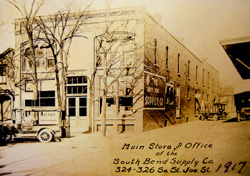“When times are good everybody reaps the spoils and when things get bad the family stands by the employees and the community and doesn’t go anywhere,” Bohannon says. “We’re so rooted in the community it’s tough to do anything else but hang in there.”
Mid-Cape has always attempted to cushion employees from the effects of downturns and to keep information flowing. “The biggest thing we do with our employees is communicate with them one on one. I want them to know what we’re doing,” Bohannon stresses. He believes that explaining situations realistically and honestly with employees during rough patches gives them an appreciation of what the company has to do to save jobs.
Because its 300-plus employees are so important to Mid-Cape’s success and survival, management began holding family breakfasts for new hires so they can get to know staff members and their families. Bohannon and other leadership have been surprised to learn that many new hires have a family connection to Mid-Cape.
Mid-Cape Home Centers further strengthens this connection by encouraging employee volunteering and by its own involvement in local home builders associations, support of local hospitals and the YMCA, and contributing to scouting organizations and camps. —Stephani L. Miller
Foxworth-Galbraith Lumber Through boom and bust, Foxworth-Galbraith has thrived while supplying the Southwest.
The story rolls like a spaghetti Western. It was May 1901 when A.P. Jackson, managing three lumberyards deep in the New Mexico territories, received an urgent telegram from his business associate H.W. Galbraith summoning Jackson back to headquarters in the dusty Texas panhandle. “Take the next train back to Dalhart,” read the wire announcing the finding of a sought-after business partner. “I believe we have found our man.” That partner turned out to be W.L. Foxworth, a Mississippi lumberman with as much zest and zeal for the lumber business as Galbraith and Jackson. Over the ensuing decade, the newly re-branded Foxworth-Galbraith Lumber grew along with the railroads, including the Denver City and Fort Worth Line and Johnny Cash’s storied Rock Island Line. Foxworth-Galbraith even had its own close shave with the Old West when one of its yards was raided by legendary Mexican bandito Pancho Villa, who, according to current company chairman Walter Foxworth, “came in and shot up the whole town.”
Thankfully, business has changed quite a bit since then. In fact, “the ability to change and adapt with the times has been one of our biggest strengths,” says Foxworth of his company’s 106-year longevity. In the ‘20s, for instance, Foxworth-Galbraith yards stayed open 24 hours to feed the demand for building materials as the Texas oil industry boomed. During the Depression, business swung to opposite extremes, and one yard went 10 days without a sale. “Things have always changed, and they are changing now,” Foxworth says, adding that the company is already feeling some of the expected slowdown in residential construction.
Don’t expect any rides off into the sunset, though. “We’re on our fourth generation of ownership,” Foxworth says. That’s the fourth generation of both Foxworths and Galbraiths, a combination that thus far has been successful facing just about any business frontier. —Chris Wood

